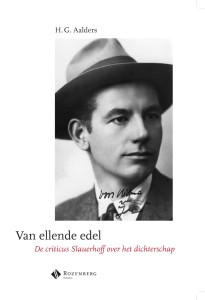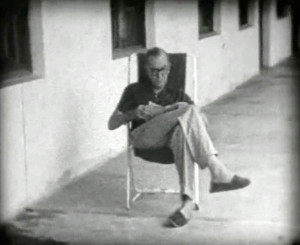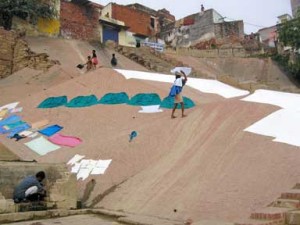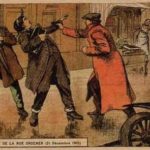Van ellende edel. Bijlage V ~ Slauerhoffs besproken gedichten (hoofdstuk 11 en 13)
 De Ardennen (Vg 827/8)
De Ardennen (Vg 827/8)
Een (gebroken) Sonnettenkrans, door Jacquelin
I. Pelgrimstocht
O, de gewijde grotten! Wij bezochten
Om te beginnen die van Remouchamps,
Liefkoosden warm in de ijskoude krochten,
En daalden daarna in die van Dinant,
Een pas ontdekte – België is hòl er van
Sinds de entrees stegen op meer dan tien francs.
De vroomheid bleef. ’t Vermogen niet. Wij kochten
Ons niet meer ’t Allerheiligste van Han,
En zochten troost in Brussels Scala, voor
De ontwijding van het Heilge Land van Tachtig,
En vonden met verrukking, achter ’t koor,
België’s Libanon nu eerst waarachtig
Grootsch: grotten grijnsden, gletschers glansden prachtig,
Want hier beleed zich oprecht het Décor. Read more
Van ellende edel ~ Bibliografie
 Abrams, M.H. – 1953 The Mirror and the Lamp. Romantic Theory and the Critical Tradition. Oxford University Press. Londen / Oxford / New York.
Abrams, M.H. – 1953 The Mirror and the Lamp. Romantic Theory and the Critical Tradition. Oxford University Press. Londen / Oxford / New York.
Akker, W.J. van den – 1984 ‘En marche vers le ciel. Over “Het lied der dwaze bijen”’. In: De revisor 11 (1984) 4 (aug): 72–79,85.
Akker, W.J. van den – 1985 Een dichter schreit niet. Over de versexterne poëtica van M. Nijhoff. 2 dln. Proefschrift Utrecht. Veen. Utrecht.
Akker, W.J. van den – 1987 ‘De schrijver in een impasse; over “De schrijver” van M. Nijhoff (I)’. In: De nieuwe taalgids 80 (1987) no. 5: 386–406.
Akker, W.J. van den en G.J. Dorleijn – 1985 ‘Stemmen uit de redactie. Een documentatie over het redactiebeleid van De gids tussen 1916 en 1926’. In: W.J. van den Akker e.a. (red.), Traditie en vernieuwing. Opstellen aangeboden aan A.L. Sötemann. Veen. Utrecht / Antwerpen: 146–177.
Anbeek, T. – 1996 Het donkere hart. Romantische obsessies in de moderne Nederlandstalige literatuur. Amsterdam University Press. Amsterdam.
Anbeek, T. – 1999 Geschiedenis van de literatuur in Nederland, 1885–1985. Arbeiderspers. Amsterdam / Antwerpen. 5de, herz. dr. (1ste dr. 1990).
Bai Juyi – 2001 Gedichten en proza. Vertaling en toelichting W.L. Idema. Atlas. Amsterdam / Antwerpen.
Bakker, S. – 2002 ‘J. Slauerhoff’. In: A. Zuiderent, H. Brems en T. van Deel (red.), Kritisch lexicon van de moderne Nederlandstalige literatuur. 86ste aanv., aug.
Baudelaire, Ch. – 1976 O’Euvres complètes II. Éd. C. Pichois. Gallimard. Parijs. Bibliothèque de la Pléiade no. 7].
Baudelaire, Ch. – 1995 De bloemen van het kwaad. Vertaling en commentaar P. Verstegen. Van Oorschot. Amsterdam [Franse bibliotheek – klassiek]. Tweetalige uitgave (integrale vertaling van de 2de druk van Les Fleurs du mal. Poulet-Malassis et De Broise. Parijs 1861)
Bergh, Hans van den – 2002 ‘Paul Verlaine – voorvechter van het symbolisme?’. In: De tweede ronde 23 (2002) 3 (herfst): 91–99 [Verlaine-nummer].
Bergh, Herman van den – 1918 ‘Studiën (tweede reeks) VI: Van grondslag en onderscheid’. In: Het getij 3 (1918): 192–196. Ook in: idem, Nieuwe tucht. Studiën over litteratuur. De Spieghel. Amsterdam z.j. [1928]: 7–13. Read more
De wereld draait door ~ Van Dis en Meinderts over de nalatenschap van Slauerhoff (April 2014)
Het Letterkundig Museum in Den Haag bemachtigde de literaire nalatenschap van zwervend dichter en schrijver J.J. Slauerhoff. Adriaan van Dis en museumdirecteur Aad Meinderts lichtten toe wat er in de kist en vijftig dozen werd aangetroffen.
VARA ~ De wereld draait door ~ april 2014
Tiny Bouts Of Contentment. Rare Film Footage Of Graham Greene In The Belgian Congo, March 1959
My purpose in this contribution is to present and contextualize the only film footage ever recorded of the novelist Graham Greene (1904-1991) in the Belgian Congo in 1959. The footage was filmed with an 8mm camera, which did not record sound. It belongs to Mrs. Édith Lechat (née Dasnoy;1932-) and her husband, the leprosy specialist Doctor (later Professor) Michel Lechat (1927-2014).
From 1953 through 1960, Dr. Lechat was head of the leper hospital and colony of Iyonda, a village and mission station some 15 kms south of the city of Coquilhatville (now, Mbandaka) in central-western Congo. Greene stayed a number of weeks in Iyonda and other mission stations in the region in search of inspiration, a setting, and material for a new novel. The novel, A Burnt-Out Case, appeared in 1960, and was dedicated to Dr. Lechat. Greene occupied a room in the house of the missionary fathers in Iyonda, but spent long parts of his days with the doctor and his family. The film reached me through the hands of Édith Lechat, who had it transposed to a DVD-playable format, and via my friend Hendrik (a.k.a., “Henri” or “Rik”) Vanderslaghmolen (1921-), who was a missionary in the region at the time. As he was one of the only Belgian missionaries there with some knowledge of English, he often accompanied Graham Greene during his trips from one mission station to another. Rik Vanderslaghmolen and the Lechats are still close friends today.
Much of the information I offer below stems from conversations I had with both Rik Vanderslaghmolen and Édith Lechat in July and August 2013. Regrettably, Dr. Michel Lechat’s poor health condition did not allow me to probe his memory, but an interview he gave for the Brussels-based weekly The Bulletin on the occasion of Greene’s death in 1991 is available (Lechat 1991), as well as a closely similar talk he gave at the 2006 Graham Greene Festival in Berkhamsted, published in the London Review of Books in August 2007 (Lechat 2007). Édith Lechat has given me the kind permission to share the film with the readership of Rozenberg Quarterly and to add the necessary contextual information on both the historical situation and the contents of the film.
T.S. Eliot Reads: The Waste Land
Roz Kaveney – TS Eliot’s The Waste Land: the radical text of a wounded culture
Siegfried Sassoon once wrote a poem complaining about a concert whose audience listened to The Rite of Spring as if it were “by someone dead / like Brahms”, instead of rioting and yelling abuse. Indeed, most of the great works of 20th-century modernism have become part of the canon. People may still occasionally make disobliging remarks about Picasso, say, but we are used to TS Eliot’s The Waste Land – it is assimilated, and no longer regarded as an awful warning of the debased, degenerate way in which things are heading.
Read more: http://www.theguardian.com/waste-land
Laghukatha – Het ZKV in de Hindi-Literatuur
In Nederland is de laatste jaren een nieuw literair genre van de grond gekomen: het zeer korte verhaal, oftewel ‘zkv’. In sommige literaire tradities buiten Nederland bestaat zo’n genre al langer. India is een voorbeeld: het zeer korte verhaal is hier terug te voeren op oude fabels en volksvertellingen, en komt in het Hindi voor vanaf de tijd dat het moderne Hindi is ontstaan (tweede helft 19e eeuw). Het zkv heeft zich in verscheidene tijdvakken en maatschappelijke constellaties weten te handhaven. Ten tijde van de Moghul-dynastie (van de 16e tot de tweede helft van de 19e eeuw) bestond in het Urdu (een zustertaal van het Hindi) een levendige traditie van schetsen en raadsels en cynische commentaren op het doen en laten van de machthebbers. In het midden van de negentiende eeuw bloeide de ‘caféliteratuur’, waaronder de poëzie, als nooit tevoren; aan het hof van de laatste Moghul-keizer Zafar in Delhi, maar zeker ook daarbuiten en onder ‘gewone’ mensen.[1] Read more




